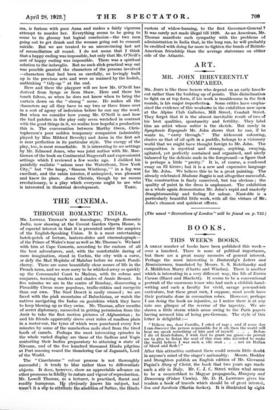THE CINEMA.
THROUGH ROMANTIC INDIA. Ma. LOWELL THOMAS'S new travelogue, Through Romantic India, now showing at the Covent Garden Opera House, is of especial interest in that it is presented under the auspices of the English-Speaking Union. It is a most entertaining hotch-potch of lecture, lantern-slides and cinematograph— of the Prince of Wales's tour as well as Mr. Thomas's. We land with him at Cape Comorin, according to the custom of all the best adventurers, and, with the comfortable daring of mere imagination, stand in Cochin, the city with a curse, or defy the Mad Moplahs of Malabar before we reach Pondi- cherry. There are some beautifully clear scenes of life in the French town, and we were sorry to be whisked away so quickly up the Coromandel Coast to Madras, with its cobras and conjurers, teeming markets and shades of Annie Besant. In five minutes we are in the centre of Bombay, discovering a Piccadilly Circus more populous, traffic-ridden and energetic than our own. The Sind Desert is easily crossed ; we are faced with the pink mountains of Baluchistan, or watch the natives navigating the Indus on goatskins which they have to keep blowing up as they swim. Mr. Thomas, after months of secret diplomacy, succeeded in getting permission from the Amir to take the first motion pictures of Afghanistan ; he and his friends apparently drove over miles of roadless plain in a motor-car, the tyres of which were punctured every few minutes by some of the numberless nails shed from the tired hoofs of camels. Perhaps the most interesting episodes in the whole varied display are those of the Sadhus and Yogis contorting their bodies preparatory to attaining a state of Nirvana, and of the five hundred thousand Hindu pilgrims at Puri massing round the thundering Car of Jaganath, Lord of the World.
The " Cinechrome " colour process is not thoroughly successful ; it tends to blur rather than to differentiate objects. It does, hoTrever, show an appreciable advance on other processes in fidelkty to nature and vigour of reproduction. Mr. Lowell Thomas, as a lecturer, is practised, fluent and readily humorous. U obviously lc:lows his subject, but ./iisn't it a slip to attribute the abolition of Suttee, the Hindu
custom of widow-burning, to the first Governor-General ? It was surely not made illegal till 1829. As an American, Mr. Thomas manifests such sympathy with the problems of administration in India that, in the long run, he will probably be credited with doing far more to tighten the bonds of British- American friendship than the average statesman on either side of the Atlantic.


















































 Previous page
Previous page